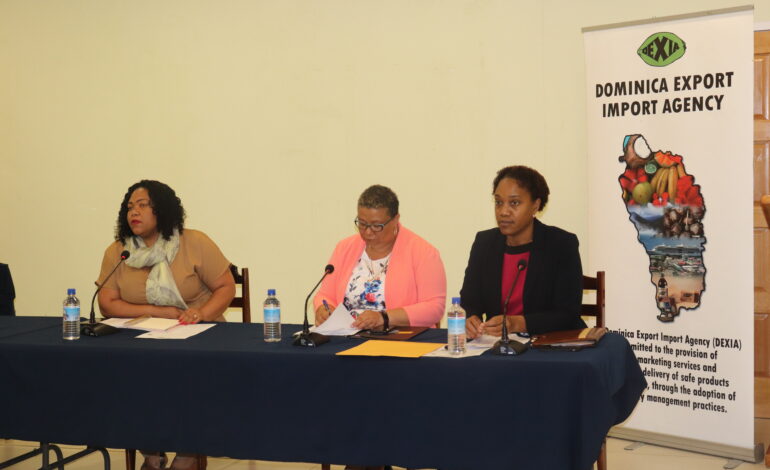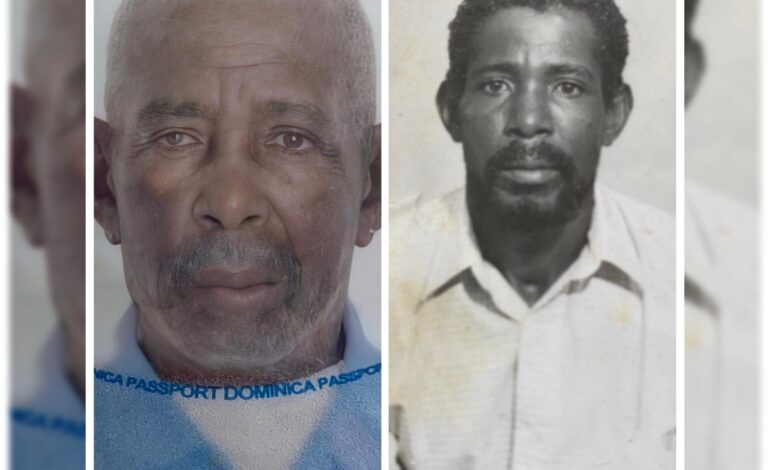
The Ministry of Blue and Green Economy, Agriculture and National Food Security now has an additional tool to assist in data management and strategic planning for the cocoa sector with the recent handing over of a cocoa financial model presented to the Ministry at the start of a training workshop organised by the Cocoa Cluster Development Project of Dominica and held on Thursday 17th June 2021 for extension staff, data and information officers, finance agents, farmers and other cocoa stakeholders who will be putting this financial tool to use.
Dr. Kyra Paul, Permanent Secretary in the Ministry of Agriculture, received the Cocoa Financial Model from Francine Baron, CEO of the Climate Resilience Execution Agency for Dominica (CREAD), the organisation which developed the model.
In mentioning government’s Cocoa Rehabilitation Project, Dr. Paul pointed that a Cocoa Coordinator has been employed and plants are being propagated to meet annual targets of 25,000 and increases in acreage within the sector which has seen “small but promising growth.”
Hon. Baron, in her remarks at the training workshop indicated CREAD’s satisfaction in developing this model, “CREAD was pleased to have been able to play a part in helping farmers understand the underlying economics of cocoa production. We were able to develop a financial model that provides the farmer with an accurate assessment of expected yield and profit based on their output and outlay of capital and resources.”
“Our hope is that by providing farmers with a clearer understanding of all the cost inputs, as well as giving them a view of potential revenues, they can plan appropriately, manage the investments necessary to establish cocoa as a viable and financially rewarding crop, and undertake the long-term financial planning that is an essential part of their resilience,” she adds.
The development of this financial model is in line with CREAD’s mandate to help Dominica become the world’s first climate resilient nation, with a focus that includes the development of solutions for creating sustainable and resilient agriculture.
Dominica, an award-winning cocoa destination, produces 100% fine and flavoured cocoa and is one of the few countries in the world who have been able to achieve International Cocoa Organization (ICCO) certification. The country, which has a long history of cocoa production, is well positioned to capitalise on the high-end global cocoa market, which delivers the highest return for farmers. The financial model developed by Economic Lead at CREAD, Brent Barnette; was created to serve as an investment tool to enable the Cocoa Cluster to implement change management initiatives with respect to improved investment planning and farm management as its members look to penetrate the global cocoa market.
The Cocoa Cluster was founded in 2019. Funded by Compete Caribbean Partnership Facility (CCPF) with the Dominica Export Import Agency (DEXIA) as the implementing Agency, the Cluster aims to build on the foundation laid by the Government’s Cocoa Rehabilitation Project and seeks to further drive the expansion and development of this promising sector. The cocoa financial model also aligns with the Cluster’s focus on change management and data management two of its five areas of improvements, the others being pre- and post-harvest management, labelling and marketing, and product transformation and development.
Wayne Elliott, Coordinator, Productivity and Innovation in Caribbean Firms and Clusters at CCPF, highlighted the organisation’s goals to support firms to “grow, compete, innovate and to enter new sectors and markets and to promote an environment that enables innovation and growth.” He also spoke to the successes that were being achieved through clustering initiatives in Dominica and encouraged attendees to continue to utilise collaborative efforts to derive greater benefits and share risks.
Cocoa Cluster Manager, Ms. Taletha Laudat stressed on the importance of “de-risking in agriculture investments for improved efficiency and profits, and how critical analytics, innovation and sustainable financing tools can improve the competitiveness of the cocoa industry.”
DEXIA General Manager Paula Platsko expressed further satisfaction with the exercise by stating, “We are quite pleased with CREAD’s support of the Project, and their agreement to develop the Cocoa Financial Model upon the request of our Executing Agency, Compete Caribbean. This Model aims to support our national resilience objectives, including economic thinking in cocoa farming decisions.”
Mr. Barnette, during his interactive presentation, highlighted the various aspects of the model and feedback was given from all participants on ease of use and applicability to real life situations. With this model cocoa farmers can plot in a range of data based on various scenarios using the results to get a better understanding of their future costs and revenues. The model can be used with other high-value crops and thus is not limited to just cocoa farmers, a feature the extension staff present were excited about. Further, financial enterprises now have evidentiary data that they can use when make lending decisions, and the representatives from the AID Bank and NDFD were encouraged by this aspect.
The existence of this financial tool and its availability to Dominica’s farmers, therefore means they are today better equipped to make sound investment decisions in cocoa farming. When considering the strides made by the Government under the Cocoa Rehabilitation Project, and the CCDP in capacity building, institutional strengthening and genetic material accession; this tool is further helping to bridge the gap between agriculture, business and finance.






